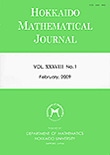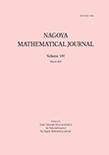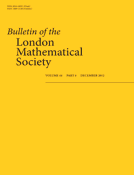
Hokkaido Mathematical Journal
Scope & Guideline
Connecting theory and application in the realm of mathematics.
Introduction
Aims and Scopes
- Algebra and Geometry:
The journal frequently publishes papers that explore algebraic structures, geometric properties, and their interrelations, contributing to the foundational understanding of both fields. - Functional Analysis and Operator Theory:
Research involving the study of operators on various function spaces is a significant area, with contributions that enhance the theoretical framework of functional analysis. - Differential Equations:
The journal features works on both ordinary and partial differential equations, particularly those that address boundary value problems and their applications in mathematical physics. - Mathematical Physics:
Interdisciplinary research that bridges mathematics and physics is prominent, with papers addressing mathematical models that describe physical phenomena. - Topology and Algebraic Structures:
The focus on topology, including algebraic topology and its applications, is evident, as well as studies on algebraic structures such as groups and rings. - Nonlinear Analysis:
The journal includes articles on the analysis of nonlinear systems, highlighting methodologies and results that contribute to the understanding of complex mathematical behaviors.
Trending and Emerging
- Advanced Topics in Nonlinear Dynamics:
An increasing number of papers are focusing on nonlinear dynamical systems, including bifurcation theory and chaos, which are crucial for understanding complex systems in various fields. - Mathematical Modeling in Physics and Biology:
There is a growing emphasis on mathematical models that apply to physical and biological systems, reflecting an interdisciplinary trend that merges mathematics with real-world applications. - Operator Algebras and Quantum Theory:
Research related to operator algebras and their applications in quantum theory is trending, indicating a rising interest in the mathematical foundations of quantum mechanics. - Analysis on Metric Spaces:
Recent articles have increasingly focused on properties and applications of analysis in metric spaces, suggesting a shift towards more generalized frameworks for analysis. - Algebraic Geometry and Its Applications:
The journal is witnessing a resurgence in interest in algebraic geometry, particularly regarding its applications in other mathematical fields and real-world problems.
Declining or Waning
- Classical Geometry:
There has been a noticeable reduction in papers focusing on classical geometric concepts and their applications, indicating a shift towards more abstract and modern geometric frameworks. - Elementary Number Theory:
Research in elementary number theory appears to be waning, with fewer publications addressing traditional topics in this area compared to previous years. - Combinatorial Mathematics:
Papers on combinatorial topics have decreased, suggesting a potential shift in focus towards more analytical or algebraic approaches within the journal.
Similar Journals

Dissertationes Mathematicae
Championing Excellence in Mathematical Scholarship.Dissertationes Mathematicae is a prestigious academic journal published by the Polish Academy of Sciences Institute of Mathematics (IMPan), renowned for its contributions to the field of mathematics since its inception. With an impressive Q1 ranking in the miscellaneous mathematics category for 2023 and positioned at Rank #73 out of 399 in General Mathematics according to Scopus, this journal serves as a pivotal platform for disseminating high-quality research and innovative theoretical developments. Spanning from 2000 to 2024, it focuses on a broad range of mathematical disciplines, encouraging interdisciplinary collaboration and advancing mathematical understanding globally. While it currently does not offer open access, the journal is highly regarded in academic circles and continues to attract submissions from respected researchers and institutions. With a commitment to excellence and a notable impact factor, Dissertationes Mathematicae plays a crucial role in the ongoing development of mathematical theories and applications, making it an essential resource for researchers, professionals, and students alike.

NAGOYA MATHEMATICAL JOURNAL
Fostering Vibrant Dialogue in the World of MathematicsNAGOA MATHEMATICAL JOURNAL, published by Cambridge University Press, is a prestigious journal that has been at the forefront of advancing mathematical scholarship since its inception in 1950. With an ISSN of 0027-7630 and an E-ISSN of 2152-6842, this journal has gained recognition for its high-quality research contributions in the field of mathematics, achieving a Q1 classification in Mathematics (miscellaneous) as of 2023. The journal’s impact is further reflected in its Scopus rank of #164 out of 399 in the General Mathematics category, positioning it within the 59th percentile of its peers. Scholars, researchers, and students can access a range of innovative mathematical studies that explore diverse topics, fostering a vibrant dialogue within the mathematical community. By catering to a global audience, the NAGOYA MATHEMATICAL JOURNAL continues to play a critical role in shaping contemporary mathematical discourse and research.

BULLETIN OF THE LONDON MATHEMATICAL SOCIETY
Advancing Mathematical Frontiers Since 1969The BULLETIN OF THE LONDON MATHEMATICAL SOCIETY, published by Wiley, is a distinguished journal that serves as a vital resource in the field of mathematics. With its ISSN 0024-6093 and E-ISSN 1469-2120, this journal has consistently provided a platform for innovative research and scholarly discourse since its inception in 1969. Recognized for its quality, it currently holds an impressive Q1 ranking in the mathematics category, a testament to its significance in disseminating influential findings and trends in the mathematical sciences. Researchers and practitioners can rely on the BULLETIN for its comprehensive coverage of both theoretical and applied mathematics, which caters to a diverse audience ranging from professionals to students alike. Though it does not currently offer Open Access options, its articles can be accessed through institutional subscriptions, ensuring that significant works reach the academic community effectively. With contributions that span over five decades, the journal continues to shape mathematical research and inspire future advancements in the discipline.

Periodica Mathematica Hungarica
Fostering Excellence in Mathematical Research and Applications.Periodica Mathematica Hungarica is a prestigious academic journal published by Springer, focusing on the field of mathematics, with a particular emphasis on miscellaneous mathematical studies. Established in 1971, this journal has maintained its commitment to advancing mathematical research and its applications, making significant contributions over its converged years through 2024. With a Q2 ranking in the mathematics category as of 2023, it establishes itself as a vital resource within the mathematical community. Researchers and academics will find its inclusion in the Scopus database, ranking #189 out of 399 in general mathematics, indicative of its impact and relevance. Although it does not feature open access, the journal provides a wealth of high-quality peer-reviewed articles, thereby serving as an essential platform for the dissemination of innovative mathematical theories, methodologies, and findings. Engaging with the content of Periodica Mathematica Hungarica is crucial for anyone looking to stay at the forefront of mathematical research and development.

RENDICONTI DEL SEMINARIO MATEMATICO DELLA UNIVERSITA DI PADOVA
Exploring the frontiers of mathematics with open access insights.RENDICONTI DEL SEMINARIO MATEMATICO DELLA UNIVERSITA DI PADOVA, published by the European Mathematical Society, stands as a notable open-access journal with a rich history in disseminating research across various domains of mathematics. With an ISSN of 0041-8994 and E-ISSN 2240-2926, this journal has embraced open access since 2023, significantly enhancing its visibility and accessibility to a global audience. Situated in Germany, its publishing house is based at Technical University Berlin, which emphasizes its academic roots and dedication to fostering mathematical research. The journal features a quartile ranking of Q3 across multiple categories including Algebra and Number Theory, Analysis, Geometry and Topology, and Mathematical Physics as of 2023, indicating a vibrant contribution to the field, despite its challenge in specific rankings. Researchers, professionals, and students alike will find in this journal a platform for innovative ideas and significant findings that are crucial to the evolution of modern mathematics.

St Petersburg Mathematical Journal
Cultivating Insights in the Heart of MathematicsSt Petersburg Mathematical Journal, published by the American Mathematical Society, is a distinguished platform that fosters research and discourse in the fields of mathematics, specifically focusing on Algebra and Number Theory, Analysis, and Applied Mathematics. With an ISSN of 1061-0022 and an E-ISSN of 1547-7371, this journal has been a reliable source of cutting-edge mathematical research since its inception in 2003 and continues to publish high-quality content through 2024. Although not open-access, it offers valuable insights and advances the mathematical community's understanding, as indicated by its respectable impact factor and Scopus rankings across various categories—landing in the Q3 quartile across three significant mathematical disciplines. Researchers, professionals, and students are encouraged to contribute and engage with this journal, as it remains a vital resource for promoting collaboration and discovery within the ever-evolving field of mathematics.

Matematicki Vesnik
Advancing mathematical discourse for a global audience.Matematicki Vesnik is a distinguished open-access journal published by the MATH SOC SERBIA-DRUSTVO MATEMATICARA SRBIJE, dedicated to advancing the field of mathematics since its inception. With an ISSN of 0025-5165 and an E-ISSN of 2406-0682, this journal has been a significant platform for disseminating research findings since its establishment in 1993. Hosted in Serbia, it embraces a broad scope of mathematical discourse while achieving a Q3 category ranking in miscellaneous mathematics for 2023. As part of its commitment to fostering scholarly communication, Matematicki Vesnik is accessible to a global audience, promoting high-quality research and innovative ideas within the mathematical community. With converged years from 1999 to 2024 and a Scopus rank of #232 out of 399 in General Mathematics, the journal plays a crucial role in enhancing visibility and impact for researchers, professionals, and students alike in the dynamic landscape of mathematical inquiry.

CUBO-A Mathematical Journal
Unlocking New Perspectives in MathematicsCUBO-A Mathematical Journal, published by the Department of Mathematics and Statistics at Universidad de La Frontera in Chile, stands as a significant Open Access resource in the field of mathematics since its inception in 2011. With an ISSN of 0716-7776 and an E-ISSN of 0719-0646, this journal invites submissions that explore a wide spectrum of mathematical disciplines, including Algebra, Number Theory, Analysis, Geometry, Topology, and Logic. Although currently positioned in the Q4 category across various mathematical domains and registered at Rank #223/399 in General Mathematics in Scopus, CUBO serves as a valuable platform for emerging researchers and practitioners to disseminate their findings. Operating under a continuous commitment to accessibility, CUBO fosters an inclusive academic environment that supports the exchange of innovative ideas vital to advancing mathematics. The journal's target audience encompasses a diverse community of researchers, professionals, and students eager to participate in the expanding dialogue within mathematical sciences.

Rendiconti del Circolo Matematico di Palermo
Exploring the Frontiers of Mathematical Thought.Rendiconti del Circolo Matematico di Palermo, published by SPRINGER-VERLAG ITALIA SRL, is a revered journal in the field of mathematics, emphasizing the cultivation and dissemination of mathematical knowledge since its inception in 1887. With its ISSN 0009-725X and E-ISSN 1973-4409, this esteemed publication has continued to thrive, showcasing innovative research, comprehensive reviews, and thoughtful discussions from diverse areas in mathematics, particularly in its Q2 ranking within the miscellaneous mathematics category. Its historical significance is underscored by its convergence of publications across numerous years, including its notable periods from 1887 to 1916, 1919 to 1938, and beyond, effectively capturing the evolution of mathematical thought. Though not open access, the journal remains an essential resource for researchers, professionals, and students aiming to stay updated with the latest advancements and methodologies in the ever-evolving landscape of mathematics. With its Scopus rank placing it in the top 25th percentile, Rendiconti del Circolo Matematico di Palermo continues to be a cornerstone for scholarly dialogue and development in its domain.

Bulletin Mathematique de la Societe des Sciences Mathematiques de Roumanie
Elevating Mathematical Knowledge for Global ImpactThe Bulletin Mathematique de la Societe des Sciences Mathematiques de Roumanie, published by SOC MATEMATICE ROMANIA, is a distinguished platform dedicated to the dissemination of advanced mathematical research and developments. With ISSN 1220-3874 and E-ISSN 2065-0264, this journal serves the global mathematical community, particularly in Romania, fostering collaboration and innovation in varied mathematical disciplines. Despite being categorized in the Q3 quartile of the *Mathematics (miscellaneous)* field and holding a Scopus rank placing it in the 19th percentile, the journal remains committed to publishing high-quality articles that explore theoretical and applied mathematics. Running from 2008 to 2024, it aims to encourage the sharing of knowledge and advancements within both academic and practical domains, affirming its importance as a valuable resource for researchers, professionals, and students alike. Although the journal does not currently offer open access, it contributes to the mathematical discourse through the rigorous selection of papers that adhere to high scholarly standards.